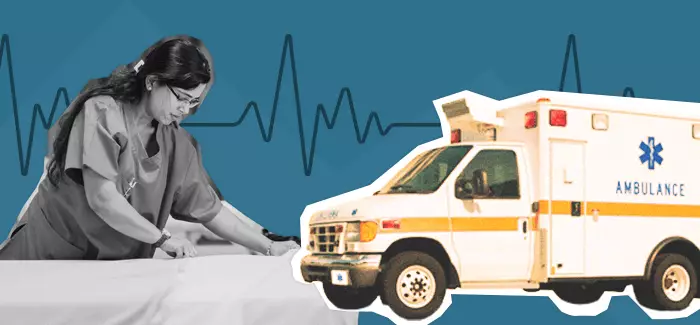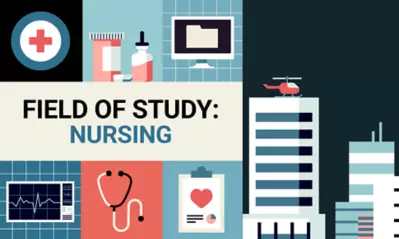How to become an ER nurse

Written by Morganne Skinner

This article was reviewed by Raelene Brooks, Dean, College of Nursing.

You’ve likely seen ER nurses in popular medical dramas for television or reality shows about emergency medicine. While their jobs are often depicted as fast paced and high impact, the reality is often more nuanced.
These registered nurses (RNs) work in hospital emergency rooms and are referred to as emergency department (ED) nurses or emergency room (ER) nurses. They provide acute care and lifesaving interventions to patients of all ages — from infants to the elderly. Let’s take a closer look at this nursing specialty.
Specialty skills in ER nursing  
Because of the unpredictable nature of the emergency room, the nursing skills these professionals use can vary widely. In just one day, a nurse may respond to a trauma, administer blood products, start multiple IV lines, clean wounds, perform CPR and make quick decisions about urgent care.
Unlike a bedside nurse who cares for a specific patient population, like orthopedic or neuro, nurses in the ER care for all patients and all ages. This requires a broad knowledge of emergencies and complications that can affect newborns, toddlers, children, adolescents, adults and the elderly. Emergency department nurses also need to have astute emergency response skills, like performing CPR, using a bag-valve mask, inserting an intraosseous device, providing wound care, interpreting lab diagnostic tests, reading x-rays, treating spinal injuries and assessing trauma.
All nurses are required to have active basic life support licenses, while nurses in the ER may also need advanced cardiac life support and pediatric advanced life support licenses to competently care for different populations in emergencies. Depending on the facility they work in, nurses in the ED may also need training in trauma response, such as a course in trauma nursing care or advanced trauma course.
Where do emergency department nurses work?
As the title implies, a career in ER nursing means you’ll likely work in the emergency department. These nurses may also work in a trauma center, triage center or military facility. They may serve in critical care transport or life flight. However, there’s a variation in patient acuity depending on the facility type. For example, an ED at a level 1 trauma center treats the most severe trauma injury, so nurses there may need to be highly specialized. ER nurses working at a level 5 trauma center still respond to injuries, but they would stabilize patients for transfer to a more advanced trauma center.  
Work environment
The emergency room is known to be hectic and constantly changing. Emergency room nurses truly never know what is going to happen. They could have a few hours treating stomachaches, a broken arm and the flu. Then, they could have three gunshot wound patients arriving, along with two car accident patients with multiple injuries. Next, every single trauma bay is filled. Later, they could have a patient with a head injury and suspected head bleed, another patient having a heart attack, and a third having a stroke. All at the same time.  
Although emergency rooms are extremely fast paced, they have more staff and equipment in one central location so that everything can happen more quickly. Additionally, emergency rooms usually have ER techs, also called medical techs or patient care technicians, who assist doctors and nurses in delivering care. Unlike other units in the hospital, no two shifts are the same and you most likely won’t see the same patients the next day.  
ER nursing qualities
Nurses who thrive in the ED adapt quickly, work well under stress and pressure, have strong critical thinking skills and are great communicators. Additional qualities that are needed for ER nursing include:
- Flexibility
- Interpersonal skills
- Detail oriented
- Emotional intelligence
- Time management
- Assertiveness
- Teamwork
Because the emergency room is fast paced, and truly anything can happen, these nurses must be able to quickly communicate their assessment for timely medical interventions. They must also work together with their team members, keeping everyone apprised of patient changes or new information that emerges as they gather patient history, speak to family members and assess the patient. 
Steps to becoming an emergency room nurse
Your first step in becoming an ER nurse is to become a RN. You can enroll in a two-year program and earn an Associate Degree in Nursing (ADN) or a four-year program and earn a Bachelor of Science in Nursing (BSN).
As ADN programs are shorter in length than BSN programs (two years instead of four), obtaining an ADN is a faster way to get the basic education needed to become an RN. However, employers may prefer or require nurses to have a BSN. A BSN builds additional clinical, critical thinking, communication and leadership skills. If you start with an ADN and then want to get your RN, you can then enroll in an RN-to-BSN program and earn your bachelor’s degree in two years or less.
2. Pass the NCLEX
After graduating from an accredited nursing school, you’ll be eligible to take the NCLEX examination and apply to receive your registered nursing license. Everyone must take this exam to become an RN in the U.S., regardless of whether you attended an ADN or BSN program before applying.
3. Gain ER nursing experience
Once you have your RN license, you can start working as a nurse! You can apply to work in the emergency department as a new graduate nurse, although some nurses prefer to gain experience in other areas before transitioning into the ER.
There are hospitals that offer “new grad residency” programs to provide additional training and mentorship to new nurses who will be working in acute care areas, such as the emergency room. You may see these advertised in the job posting as “registered nurse residency” or “new grad residency emergency department.” These programs typically last a few months and are often required by the facilities that offer them.
If your desired workplace doesn’t offer residency programs but does require nursing experience, consider first working in a med-surg unit in the hospital. You’ll encounter a variety of patient conditions and populations that will prepare you for the emergency department. Additionally, you may be able to shadow a nurse during a shift in the emergency room to give you more insight. 
Education and degrees for emergency room nursing
All nurses working in the emergency room need at least a nursing degree and nursing license. Some nurses choose to attend an ADN program to earn their RN license, and then will start working in the ER. Others will pursue their BSN first, then RN license, and then start working as an RN. Either pathway is fine!
Those who have obtained their RN license after attending an ADN program may choose a BSN program so they can apply their previously earned credits to obtain their bachelor’s nursing degree.
After you’ve become an emergency department nurse and had at least a couple years of experience, you may wish to pursue an additional voluntary certification. Holding a certification in your nursing specialty conveys your dedication to quality, evidence-based care in that field.
Learn more about becoming an ER nurse 
After reading about the steps to become an ER nurse, are you ready to get started? With ∆fl…´ ”∆µ‚Äôs flexible nursing programs, you can earn your BSN whether you already have your RN license or are switching careers. While all these programs are online, each has a clinical component that occurs in the state of the student‚Äôs residence at an approved facility.
●      RN to BSN program: Already have your RN license? Earn your BSN in just 14 months (if you transfer 87 credits from your ADN). In this program, you’ll learn leadership, communication and critical thinking skills.
●      Master of Science in Nursing programs: These programs prepare you for roles in nursing education, leadership or advanced practice nursing. The advanced practice nursing programs have a one-week in-person component.
●      Individual nursing courses: Check out some of the classes you’d take at UOPX, like Advanced Pathophysiology, when you enroll. Students must possess a valid, unencumbered RN license.
Learn more about the online nursing programs at UOPX. 

ABOUT THE AUTHOR
Morganne Skinner, BSN, RN, is a fertility educator and writer. She began nursing in the surgical-trauma intensive care unit and earned a critical care nursing certification. She earned her Bachelor of Science in nursing from Liberty University in Virginia. She served as a Peace Corps volunteer in rural Zambia for two years, fueling her passion for women’s and public health. After returning to the U.S., she worked in rehabilitation, public health, and fertility. Morganne excels in health education through her writing and fertility work, contributing to fertility and textbook companies and nursing websites, and creating practice questions for the NCLEX.

ABOUT THE REVIEWER
Dr. Raelene Brooks, dean of the College of Nursing, has been a registered nurse for more than 25 years and practiced extensively in the areas of ICU, trauma and critical care. Her publications include a focus on nursing education, critical care and diversity, equity and inclusion. She is a leader in creating, guiding and launching innovative curriculum.
This article has been vetted by ∆fl…´ ”∆µ's editorial advisory committee.¬†
Read more about our editorial process.


